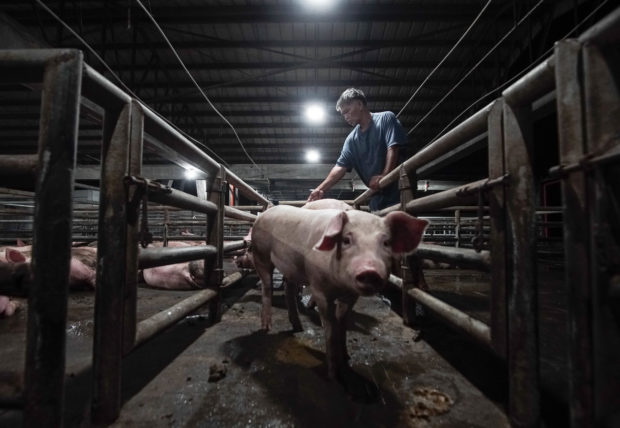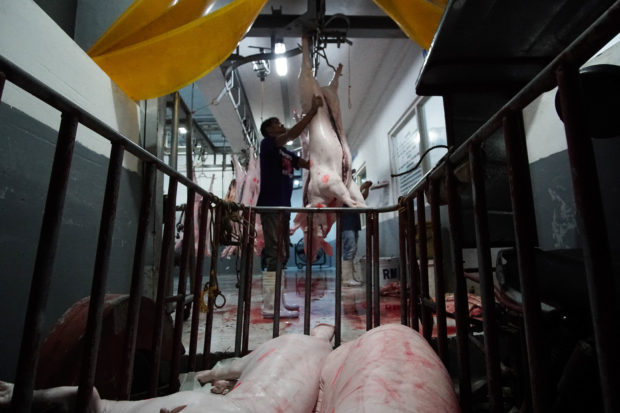African swine fever creeps into Naga

ANIMAL HEALTH ALERT Hundreds of pigs are slaughtered daily in this government-run abattoir in Legazpi City, Albay province. Local and agriculture officials in Bicol have intensified the monitoring of pig farms and the hog trade in the region to stop the spread of the African swine fever. —MARK ALVIC ESPLANA
LEGAZPI CITY, Albay, Philippines — The city government of Naga in Camarines Sur province has ordered the two-week closure of its slaughterhouse and the culling of pigs after blood samples from hogs in two villages tested positive for African swine fever (ASF).
The Department of Agriculture (DA) and the National Meat Inspection Service on Sunday confirmed that samples taken from pigs raised at Zone 5 in Barangay Pacol and at Zone 7 in Barangay Cararayan, both in Naga, were infected.
Naga Mayor Nelson Legacion, at a press conference on Monday, said a request was sent to the council to declare the city under a state of calamity so the local government’s calamity fund could be used to pay backyard raisers, whose pigs had been set for culling on Monday night.
He said the Naga slaughterhouse would also be closed after a pig tested positive for ASF in one of the hog farms in Cararayan reached the facility.
Pork ban
Naga City shares borders with the towns of Bombon and Calabanga, where eight villages have been affected with ASF. A partial state of calamity was declared in Calabanga last week after the provincial government of Camarines Sur placed the province under red alert due to the swine disease.
Article continues after this advertisementOn Feb. 20, following confirmation from the DA that the ASF virus had infected pigs in Bombon, the Naga government banned hogs and meat products from the towns of Bombon, Canaman, Magarao and Calabanga.
Article continues after this advertisementRecords from the DA showed that as of Feb. 29, 1,516 pigs had been culled in infected areas in the Bicol region.
Although each pig that will be culled will be paid P5,000, hog raisers can only list up to 20 pigs, meaning, they can not receive more than P100,000 from the DA.
Pigs within the 1-kilometer radius of the infected villages will be culled to prevent the spread of the virus.
“Due to the delay of the processing of the indemnification fee, the local government of Naga decided to give P1,000 immediately. So the P5,000 from the DA will become P6,000,” Legacion said.
The city, he said, will also pay raisers P2,000 per suckling pig that will be slaughtered.

QUALITY CONTROL A worker at the Legazpi City slaughterhouse ensures that freshly butchered pigs are cleaned thoroughly before they are delivered to local markets and meat shops. —MARK ALVIC ESPLANA
Transport on hold
In Albay, the provincial government said all live hogs within the 1-km radius of the slaughterhouse at Barangay Kilicao in Daraga town would not be allowed to be transported outside the designated zone after tests on samples from four butchered pigs turned out positive for ASF.
“This means that all the live pigs will not be consumed or transported. We will collect more samples as soon as possible,” said Pancho Mella, officer in charge of the provincial veterinary services.
Mella said the hogs came from Barangay San Fernando in Bombon, Camarines Sur, and were delivered to a trader operating a pen near the slaughterhouse.
—With a report from Ma. April Mier-Manjares